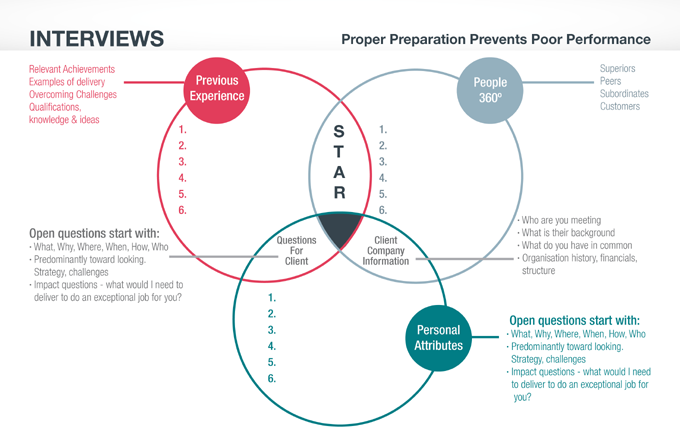Page Group celebrates its 40th birthday this year and over the last 10 years, we have arranged almost 1.5 million interviews for candidates.
Whilst many things have changed – we used to send CVs by post, kept contact details in a rolodex and Mark Zuckerberg wasn’t yet a twinkle in his daddy’s eye – one of the constants is that the majority of candidates don’t know how to prepare for an interview.

The Army have a saying, “Proper preparation prevents p**s poor performance” otherwise known as the six Ps. This is very apt in this instance as the first mistake many people make is not setting aside ample time to prepare or indeed failing to do any preparation. The next challenge is figuring out what to prepare, but how can you possibly prepare when you don’t know what you are going to be asked? This can lead long pauses before answering questions, or irrelevant waffling that doesn’t answer the questions, neither of which makes a good impression on the interviewer.
Whilst there are an infinite number of questions you could be asked at interview (after analysing feedback from interviews from the last decade of my career) I have come to the unscientific conclusion that around 90% of what you will be asked will fall into three main groups. This is where the number three comes in. Three is a divine number in many religions, every story has a beginning, middle and an end, and it is the number that represents harmony, wisdom and understanding.
More importantly in this case it’s an easy amount of topics to remember. So my three Ps of interview preparation are, past, people and personal, but more on these shortly. The next thing to think about is what your preparation looks like. The human brain is great for storing information but without structure it can be hard to access, remember, it also stores information in pictures and colour. This is what the phrase “in my mind’s eye” means.

The Interviews preparation aid uses colour and shapes deliberately as you are more likely to remember it as opposed to words alone. To make it even more effective you should draw it from scratch on a blank piece of paper as this physical act helps imprint the information in your mind.
So the next time you have an interview you can use the following process:
- Draw three large over lapping circles on a piece of paper. Two at the top and one below. Write the words previous experience (past), people and personal attributes, in different circles and the numbers one to six in each.
- Next to each number write a specific example, no more than four words, that demonstrates your ability in that area; six examples will give you enough range to vary your answers. Previous experience should include examples of your achievements, qualifications and responsibilities that are relevant to the role, sector or organisation you’re applying to. People should include examples of how you influence and build relationships with superiors, peers, subordinates, customers or external stakeholders. Include some difficult situations in this section. Personal attributes should include the things that make you unique; what are your values, qualities and drivers, and reasons they should hire you? Again, have specific examples that demonstrate these.
- Now that you have 18 examples in total, structure them in your mind using S.T.A.R.
Situation, where and who with?
Task, what did you have to do?
Action, what specific actions did you take over what time?
Result. What were the qualitative and quantitative results?
The S.T.A.R. structure helps you give a completed answer that is detailed enough but also concise so prevents you being verbose.
- Now research the company and the person(s) you are meeting. information is easy obtain so there is no excuse not to know about the company. Look at their website, news stories, and financial accounts, the LinkedIn profiles of who you are meeting and other employees and company history. Look at their company and values if published and check that some of your examples demonstrate these.
- Prepare questions for them, again I would have at least six, so if some are answered in the course of the interview you will still have more to ask. Use open questions that relate to strategy, challenges and culture. Avoid asking about salary and benefits as this can be done outside of the interview process.
- Finally you should practise, use someone you trust to ask you questions and give you honest feedback on delivery, confidence, body language and eye contact.
So once you have done all of the above you will be able to picture 18 examples that can be used to answer a variety of questions, make you feel more confident as you have prepared and cut down thinking time and silence gaps in interview; five seconds is a long time when someone is staring at you waiting for an answer.
When asked a question all you have to do is decided whether it is predominantly related to your previous experience, influencing people or your personal attributes. You will visualise the diagram, pick an example and start talking in less than two seconds.
This covers 90% of what you may be asked, if you are asked more random questions about what animal you would be just go with what comes to mind. If you are interviewing for a role that requires a particular ability e.g. analytical, creativity or sales, then you may be asked to solve a problem or come up with an idea that demonstrated these. Try to speak with someone that works in the company or your recruitment consultant to find out what style of interview that interviewer may use so you can prepare.
Of course this structure is not exhaustive and is always being updated, if you have any feedback I’d love to hear from you, and you can reach me on the contact details below.
Mark Beacom
T: +44 20 7269 2122